We've already got troops in Africa so this should come as no surprise. Gee! The mighty French military can't get this done by themselves? Read Hagel's statement @ GOOD SOLDIERS ORGANIZATION: Statement on Additional U.S. Support to France and the African Union in the Central African Republic
Navigation
Install the app
How to install the app on iOS
Follow along with the video below to see how to install our site as a web app on your home screen.

Note: This feature currently requires accessing the site using the built-in Safari browser.
More options
You are using an out of date browser. It may not display this or other websites correctly.
You should upgrade or use an alternative browser.
You should upgrade or use an alternative browser.
US To Support France in Central African Republic
- Thread starter longknife
- Start date
UNHCR is broke...

'Broke' U.N. agency pleads for help in Central African Republic
Wed Apr 16, 2014 - Inter-communal violence is tearing Central African Republic apart but the conflict is not getting the attention, or aid, needed to save huge numbers of lives, the head of the U.N. refugee agency (UNHCR) said on Wednesday.
'Broke' U.N. agency pleads for help in Central African Republic
Wed Apr 16, 2014 - Inter-communal violence is tearing Central African Republic apart but the conflict is not getting the attention, or aid, needed to save huge numbers of lives, the head of the U.N. refugee agency (UNHCR) said on Wednesday.
Almost 200,000 people have fled the country since December, and a further 160,000 are expected to this year. The UNHCR says it is spending cash there three times as fast as new funds are coming in, putting its mission in jeopardy. "Indeed, we are in trouble," UNHCR chief Antonio Guterres told diplomats as he launched a $274 million appeal. Central African Republic is only one crisis among many demanding U.N. funds stretched by humanitarian needs in South Sudan, Somalia and Yemen, as well as natural disasters such as Typhoon Haiyan in the Philippines, and above all, Syria. "Obviously there's no way we'll to be able to sustain this until the end of the year," Guterres told the diplomats. "At a certain moment we will be simply broke."
Central African Republic's government fell a year ago to Muslim Seleka rebels who were routed in December by Christian militia forces, unleashing anarchy and ethnic cleansing. "When you start cutting people into pieces and roasting them," Guterres told reporters, "It's not an army against an army - it's people doing horrible things to their neighbors." But the crisis has no major economic or strategic repercussions beyond the country's immediate neighbors, he said, so it gets little attention from the outside world. "People do not feel threatened. People feel threatened with Syria, people feel threatened with Ukraine and what might happen. Even Somalia. But in relation to the Central African Republic people don't feel threatened, don't know where it is, it's very difficult, they've never heard about it."

Internally displaced people wait for food distribution by a foreign non-governmental organization (NGO) in the town of Boda
"HEART-WRENCHING"
Diplomats at the meeting were effusive in their support but only Japan's ambassador pledged actual financial aid, and even he admitted to being not well informed on the subject. "What I heard today is much more dramatic than I had imagined before I came to this chamber," Ambassador Takashi Okada said. The U.N. appeal included a gallery of photographs of wounded and malnourished refugees arriving in Cameroon, but the official chairing the meeting said they were too "heart-wrenching" to inflict on the diplomats, who were invited to stay behind afterwards if they wanted to view them. About half left. Although the U.N. Security Council last week authorized the creation of a nearly 12,000-strong U.N. peacekeeping force, it is not due to be in place until mid-September.
William Lacy Swing, head of the International Organization for Migration and a former U.S. ambassador to Central African Republic, said the country could not wait, and the current French and African Union forces were not big enough. "The number 1 priority is to stop the fighting. You will not arrive at that without the (U.N.) blue helmets," said Swing. "Unfortunately September's a long time away. A lot of people are going to die before that force can be assembled and deployed." The first priority had to be to secure the capital Bangui, creating "zones of peace" to bring people out of 70 or more "spontaneous settlements around town where people are hunkered down hoping to avoid being killed", he said.
'Broke' U.N. agency pleads for help in Central African Republic | Reuters
Muslims get out of the Central African Republic while the gettin's good...

1,300 MUSLIMS LEAVE C. AFRICAN REPUBLIC CAPITAL
Apr 27,`14 -- Heavily armed peacekeepers escorted some of the last remaining Muslims out of Central African Republic's volatile capital on Sunday, trucking more than 1,300 people who for months had been trapped by violent Christian militants.
See also:
Looting Follows Evacuation of Muslims in CAR
April 27, 2014 ~ Heavily armed peacekeepers have escorted some of the last remaining Muslims out of Central African Republics capital, Bangui, trucking more than 1,300 people who for months had been trapped by Christian militants.
1,300 MUSLIMS LEAVE C. AFRICAN REPUBLIC CAPITAL
Apr 27,`14 -- Heavily armed peacekeepers escorted some of the last remaining Muslims out of Central African Republic's volatile capital on Sunday, trucking more than 1,300 people who for months had been trapped by violent Christian militants.
Within minutes of the convoy's departure, an angry swarm of neighbors descended upon the mosque in a scene of total anarchy. Tools in hand, they swiftly dismantled and stole the loudspeaker once used for the call to prayer and soon stripped the house of worship of even its ceiling fan blades.
One man quickly scrawled "Youth Center" in black marker across the front of the mosque. Others mockingly swept the dirt from the ground in front of the building with brooms and shouted "We have cleaned Central African Republic of the Muslims!" "We didn't want the Muslims here and we don't want their mosque here anymore either," said Guy Richard, 36, who loads baggage onto trucks for a living, as he and his friends made off with pieces of the mosque.

Muslims with their belongings are seen before they are escorted by French peacekeepers from their homes in Bangui, Central African Republic, Sunday, April 27, 2014. Heavily armed African and French peacekeepers escorted some of the last remaining Muslims out of Central African Republics volatile capital on Sunday, trucking more than 1,300 people who for months had been trapped in their neighborhood by violent Christian militants. Within minutes of the convoys departure, an angry swarm of neighbors descended upon the mosque in a scene of total anarchy. Tools in hand, they swiftly dismantled and stole the loudspeaker once used for the call to prayer and soon stripped the house of worship of even its ceiling fan blades.
Armed Congolese peacekeepers stood watch but did not fire into the air or attempt to stop the looting. Soon teams of thieves were stripping the metal roofs of nearby abandoned Muslim businesses in the PK12 neighborhood of Bangui. "Pillage! Pillage!" children cried as they helped cart away wood and metal. "The Central Africans have gone crazy, pillaging a holy place," said Congolese peacekeeper Staff Sgt. Pety-Pety, who refused to give his first name, as the mosque came under attack from militants. The anti-Balaka fighters showed up in their trademark wigs and hats with animal horns, donned in the amulets they believe protect them from the enemy's bullets.
Sunday's exodus further partitions the country, a process that has been underway since January, when a Muslim rebel government gave up power nearly a year after overthrowing the president of a decade. The United Nations has described the forced displacement of tens of thousands of Muslims as "ethnic cleansing." While previous groups have been taken to neighboring Chad, Sunday's convoys were headed to two towns in the north on the Central African Republic side of the border.
MORE
See also:
Looting Follows Evacuation of Muslims in CAR
April 27, 2014 ~ Heavily armed peacekeepers have escorted some of the last remaining Muslims out of Central African Republics capital, Bangui, trucking more than 1,300 people who for months had been trapped by Christian militants.
Moments after the convoys departed Sunday, Christians swarmed into and picked apart houses and a mosque in Bangui's PK12 neighborhood, which had been a Muslim stronghold in the majority Christian south. Armed Congolese peacekeepers stood watch, but did not attempt to stop the looting.
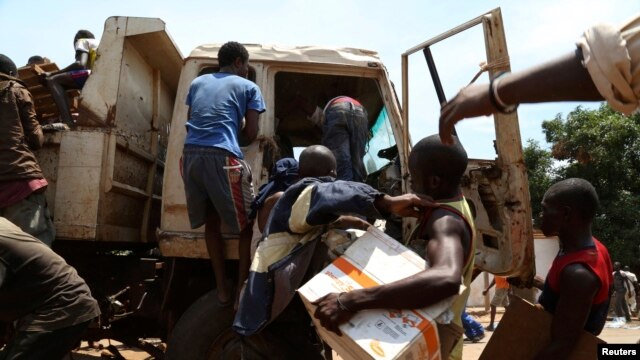
Christians carry property left behind by the Muslim community who were evacuated from the PK12 neighborhood in Bangui
The exodus further partitions the country, a process that has been under way since January, when a Muslim rebel government gave up power nearly a year after overthrowing the president of a decade.
The United Nations has described the forced displacement of tens of thousands of Muslims as "ethnic cleansing.''
Earlier, Reuters news agency reported that at least 22 people, including 15 local chiefs and three local members of staff of the medical charity Doctors Without Borders, were killed in an attack about 450 kilometers north of Bangui. A local official told the news agency most were killed in an attack on a clinic run by the charity while the chiefs were holding a meeting there.
Looting Follows Evacuation of Muslims in CAR
Republic of Logone secedes from CAR...
Central African rebel leader declares autonomous republic
15 Dec.`15 - Central African Republic rebel leader Noureddine Adam, who has rejected elections aimed at ending years of bloodshed, has declared an autonomous state in his northeastern stronghold just weeks ahead of the planned polls, a spokesman said on Tuesday.
Central African rebel leader declares autonomous republic
15 Dec.`15 - Central African Republic rebel leader Noureddine Adam, who has rejected elections aimed at ending years of bloodshed, has declared an autonomous state in his northeastern stronghold just weeks ahead of the planned polls, a spokesman said on Tuesday.
"The Republic of Logone was proclaimed Dec. 14 in (the town of) Kaga-Bandoro," Maouloud Moussa, Adam's spokesman and chief lieutenant, told Reuters. "What we want first of all is autonomy. Then we'll look at how to move towards independence."
http://news.yahoo.com/central-african-rebel-leader-declares-autonomous-republic-120114953.html
Preliminary results from Sunday's referendum show 90 percent voting yes...
Voters in CAR Show Overwhelming Support for New Constitution
December 17, 2015 - Voters in the Central African Republic appear to have overwhelmingly approved a new constitution aimed at stopping more than three years of violence between Muslims and Christians.
See also:
'Gross institutional failure' by UN on child sex abuse case
Dec 17,`15 -- The United Nations' "gross institutional failure" to act on allegations that French and other peacekeepers sexually abused children in the Central African Republic led to even more assaults, according to a new report released Thursday.
Voters in CAR Show Overwhelming Support for New Constitution
December 17, 2015 - Voters in the Central African Republic appear to have overwhelmingly approved a new constitution aimed at stopping more than three years of violence between Muslims and Christians.
Preliminary results from Sunday's referendum show 90 percent voting yes. Voting in parts of the country where militias threatened violence, including a Muslim neighborhood in Bangui, was postponed. Those ballots have yet to be counted. The Red Cross says five people were killed and at least 20 others injured Sunday as supporters and opponents of the referendum traded gunfire in Bangui.
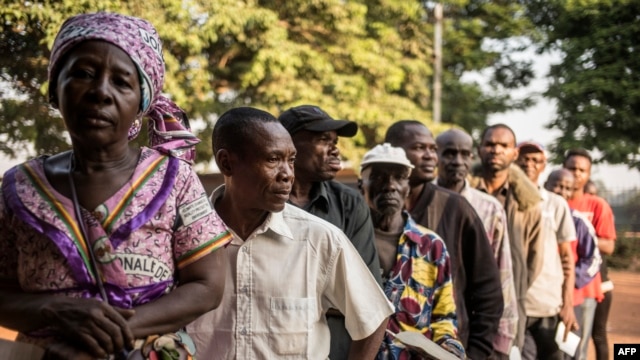
Voters line up outside a polling station in Bangui, to vote for a constitutional referendum
Hundreds marched to the headquarters of U.N. peacekeepers in the capital Wednesday, demanding that the "enemies of peace" be driven out. If passed, the new constitution would limit the president to two five-year terms, cut the power of the military, and ensure religious freedom. Elections for a new president and parliament are scheduled for later this month.
Thousands have been killed and hundreds of thousands driven from their homes since Muslim Seleka rebels briefly seized power in CAR and ousted President Francois Bozize. This led to the rise of a Christian militia and brutal fighting between Christians and Muslims. Christians also are angered about a court decision barring Bozize from running in the upcoming election. A U.N. peacekeeping force is in CAR and Pope Francis visited last month, urging peace.
Voters in CAR Show Overwhelming Support for New Constitution
See also:
'Gross institutional failure' by UN on child sex abuse case
Dec 17,`15 -- The United Nations' "gross institutional failure" to act on allegations that French and other peacekeepers sexually abused children in the Central African Republic led to even more assaults, according to a new report released Thursday.
One young boy who initially reported an attack on his friends more than a year ago now says he has been raped, too. The independent panel found that the accounts by children as young as 9 of trading oral sex and other acts in exchange for food in the middle of a war zone in early 2014 were "passed from desk to desk, inbox to inbox, across multiple U.N. offices, with no one willing to take responsibility." Among those said to have looked the other way were the U.N. children's agency, UNICEF, as well as human rights staffers.
U.N. Secretary-General Ban Ki-moon, in a statement, expressed "profound regret that these children were betrayed by the very people sent to protect them" and said he accepted the panel's broad findings. The panel, led by Canadian judge Marie Desc2hamps, found that U.N. staffers failed or hesitated to pass the children's allegations to more senior officials, sometimes because of political concerns with France involved; showed "unconscionable delays" in protecting and supporting the children; failed to further investigate the allegations; failed to properly vet peacekeepers for past abuses; and, overall, appeared more concerned with whether one U.N. staffer had improperly alerted French authorities. "The welfare of the victims and the accountability of the perpetrators appeared to be an afterthought, if considered at all," the report says.
As of now, more than a year and a half after U.N. staffers first heard the children's allegations of sexual abuse, no one has been arrested. Four French soldiers were questioned last week and released without charge, according to the Paris prosecutor's office. They have not been publicly identified. The new report lays bare one of the most persistent and embarrassing problems for the U.N. and its member countries as tens of thousands of peacekeepers serve in some of the world's most volatile areas: Some vulnerable people are raped by their protectors, and often no one is punished. Many victims are children.
The children in Central African Republic's capital, Bangui, reported the abuses in the middle of deadly chaos. The country had been ripped apart by violence between Christians and Muslims, and thousands of frightened people had sought shelter in squalid camps at the airport. French and other peacekeepers were trying to establish security. The children told U.N. staffers that they had been hungry and did what the peacekeepers asked in return for food.
MORE
Last edited:
CAR elections begin with support of African Union...
Central African Republic elections finally begin
Dec. 30, 2015 - With 30 candidates campaigning for the presidency, a runoff election in January is likely.
See also:
AU Committed to Help CAR Return to Constitutional Rule
December 30, 2015 - The African Union's Peace and Security Council will meet to decide when to lift its suspension of the Central African Republic once a legitimate president is chosen and inaugurated, an AU official said Wednesday as the CAR held elections aimed at returning constitutional rule to the country.
Central African Republic elections finally begin
Dec. 30, 2015 - With 30 candidates campaigning for the presidency, a runoff election in January is likely.
Voters in the Central African Republic went to the polls Wednesday after rebels ended a threat to disrupt the presidential and legislative election. Long lines of voters were observed in the capital, Bangui, and in other communities. It is hoped the election will end a three-year period of sectarian conflict, begun when the Muslim Seleka rebel group seized power in the impoverished, diamond-producing nation in 2013. Christian militias took up the fight against the Selekas, and United Nations military forces are now charged with maintaining order in the country.
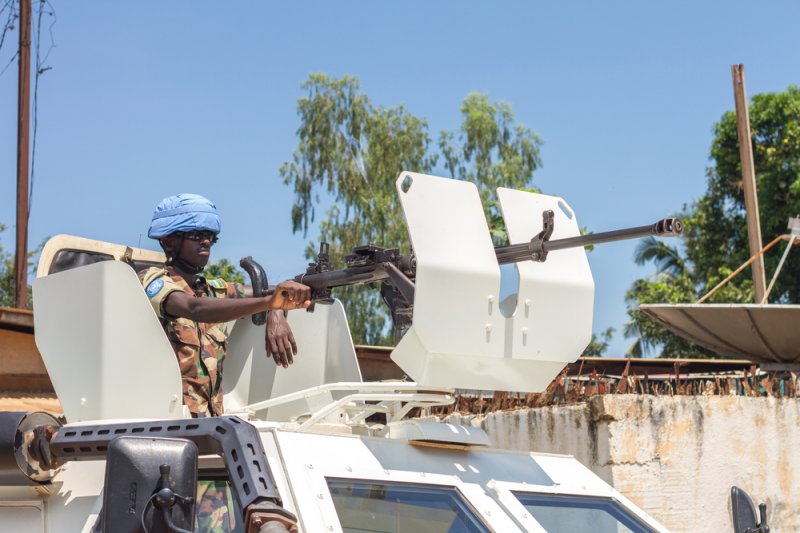
A peacekeeper conducts patrol in Bangui, Central African Republic. The country conducted presidential and legislative elections
Thousands have been killed, and 20 percent of the republic's population has fled to neighboring countries. Two former prime ministers, Anicet-Georges Dologuele and Martin Ziguele, are front-runners in a 30-candidate field; a third is Karim Meckassoua, who served in the government of President Francois Bozize until 2013. A runoff election, which is likely, will be conducted Jan. 30 if no candidate receives a majority of the vote Wednesday.
Elections for the 105-member National Assembly are also in progress. The election has been postponed four times since February, because of logistical problems and the threat of violence. Pope Francis briefly visited the republic in November, calling for peace between Christians and Muslims.
Central African Republic elections finally begin
See also:
AU Committed to Help CAR Return to Constitutional Rule
December 30, 2015 - The African Union's Peace and Security Council will meet to decide when to lift its suspension of the Central African Republic once a legitimate president is chosen and inaugurated, an AU official said Wednesday as the CAR held elections aimed at returning constitutional rule to the country.
The CAR was suspended following the 2013 overthrow of President Francois Bozize, and the subsequent turmoil after rebel leader-turned president Michel Djotodia was forced to resign. Many lives were lost in the ethnic and religion-based violence that forced many citizens to flee their homes to safer areas and to neighboring countries.
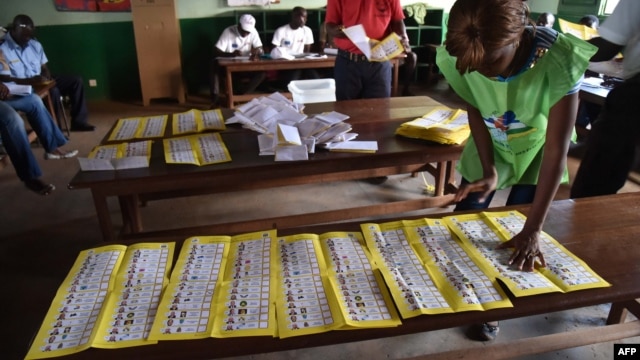
Election workers count votes after polls closed during the presidential and legislatives elections in Bangui's city center, Central African Republic
The bloc is committed to its principle of “zero tolerance” of the unconstitutional or violent overthrow of a constitutionally elected government, said the AU's commissioner for political affairs, Aisha Laraba Abdullahi. “We have taken very strict and serious measures on our member states that have violated our instruments... We insist that Africa must be governed and governed properly, that constitutionalism and rule of law should be upheld - that the era of human rights should be ushered in, that all our citizenry should be protected in whatever place they find themselves,” said Abdullahi. “We push for credible elections. We understand that this election in the Central African Republic is happening after a series of violence in the country; but, we hope that whomever is elected as the next president of the Central African Republic will ensure further stability in that richly endowed country that has been pillaged and has suffered over a period of time.”
Wednesday's vote was largely peaceful, according to observers, despite concerns about possible violence. Security officers were deployed to ensure a peaceful atmosphere for voters. Former Senegalese prime minister Souleymane Ndene Ndiaye headed an AU observer mission that monitored the vote. His team of 30 short-term observers represented the Pan African Parliament, the Permanent Representatives Committee of the African Union, election management bodies, civil society organizations, research organizations, media and academic institutions.
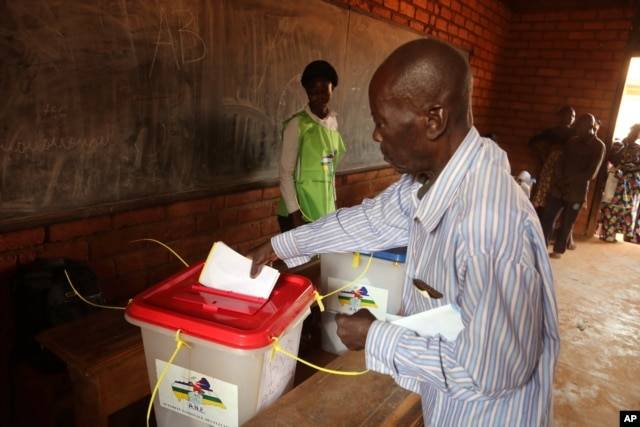
A man casts his ballot during elections in Bangui, Central African Republic
Commissioner Abdullahi said the African Union supported the country’s electoral commission by providing financial and logistical help so the poll could be administered. She also voiced hope for a peaceful future for the African nation. “With the election held today, we are confident that the transition in the Central African Republic is coming to an end, and that this would usher in peace and stability and prosperity to the Central African Republic,” said Abdullahi. “Our engagement with the Central African Republic will not just remain with the election. After the elections, we shall support the country to rebuild its institutions…A lot of things have to be done, but we remain committed to support this country to return to normalcy after the elections.”
AU Committed to Help CAR Return to Constitutional Rule
Rebels raidin' aid reserves in C.A.R....

Gunmen loot aid compounds in Central African Republic
Saturday 20th May, 2017 - Gunmen have looted humanitarian compounds as fighting grips the Central African Republic town of Bria, while more than 20,000 people have fled to a nearby UN peacekeeping base, authorities said.
See also:
20,000 flee latest fighting in Central African Republic
May 19,`17 -- Gunmen looted humanitarian compounds as fighting gripped the Central African Republic town of Bria while more than 20,000 people have fled to a nearby U.N. peacekeeping base, authorities said Friday.

Gunmen loot aid compounds in Central African Republic
Saturday 20th May, 2017 - Gunmen have looted humanitarian compounds as fighting grips the Central African Republic town of Bria, while more than 20,000 people have fled to a nearby UN peacekeeping base, authorities said.
Concerns are mounting that sectarian violence is again spiralling out of control, even in places that were previously spared during the conflict that began in late 2013. Clashes erupted in Bria again on Friday and the situation was worsening, according to the UN humanitarian agency. At least five people have been killed and several dozen wounded since the unrest began on Tuesday. "Armed groups came to humanitarian compounds and pillaged a warehouse," said the agency's chief of office for the country, Joseph Inganji. "There's fighting taking place but we don't know who's fighting who."

Clashes erupted in Bria again on Friday and the situation was worsening, according to the UN
In November, the central town was the site of fierce clashes between two splinter groups of the mostly Muslim rebel movement called Seleka that has battled with Christian militia fighters. Human Rights Watch said at least 14 people were killed over 11 days of fighting in Bria. Other previously calm parts of the country have seen deadly fighting in recent days. Since May 8, more than 150 people, including six UN peacekeepers, have been killed in attacks in the south-eastern town of Bangassou, the southern town of Alinadao and in Bria, according to the UN, which has warned the death toll could rise.
In the capital, Bangui, tensions were running high. People spoke of the fighting in Bangassou and Bria in hushed tones, turning up the radio whenever the names of the towns came on. Businesses in the Muslim neighborhood of PK5 were closed in protest at the violence in Bangassou, where Muslims were reportedly targeted. The humanitarian community's appeal for aid for Central African Republic, one of the world's poorest countries, is only 16% funded.
Gunmen loot aid compounds in Central African Republic - BelfastTelegraph.co.uk
See also:
20,000 flee latest fighting in Central African Republic
May 19,`17 -- Gunmen looted humanitarian compounds as fighting gripped the Central African Republic town of Bria while more than 20,000 people have fled to a nearby U.N. peacekeeping base, authorities said Friday.
Concerns are mounting that sectarian violence is again spiraling out of control in the country, even in places that previously were spared during the conflict that began in late 2013. At least 20 people have been killed and several dozen wounded since the unrest in Bria began on Tuesday, said U.N. mission spokesman Herve Verhoosel. He told The Associated Press that fighting was focused on the Bria airport Friday morning between rebel groups. Meanwhile, U.N. troops intervened to stop youth from looting and burning houses in an area where most humanitarian organizations are based. More than 50 aid workers were now sheltering at the U.N. base, he said. Verhoosel called the situation "calm but unpredictable," with peacekeepers deployed in key areas of town.
The U.N. mission "deeply regrets that one more time, civilians pay the highest price," he said. Earlier, the U.N. humanitarian agency's chief of office for the country, Joseph Inganji, told the AP that armed groups came to humanitarian compounds in Bria and pillaged a warehouse. "There's fighting taking place but we don't know who's fighting who," he said. Attacks also targeted places of worship and government buildings, the medical charity Doctors Without Borders said in a statement, adding that at least 44 casualties had been treated at the local hospital since Monday. "These are stirring up ethnic and religious divides."
Bria in November was the site of fierce clashes between two splinter groups of the mostly Muslim rebel movement called Seleka that has battled with Christian militia fighters. Human Rights Watch said at the time that at least 14 people were killed. Other previously calm parts of the country have seen deadly fighting in recent days. Since May 8 more than 150 people, including six U.N. peacekeepers, have been killed in attacks in the southeastern town of Bangassou, the southern town of Alinadao and in Bria, according to the U.N., which has warned the death toll may rise.
In the capital, Bangui, tensions were running high. People spoke of the fighting in Bangassou and Bria in hushed tones, turning up the radio whenever the names of the towns came on. Businesses in the Muslim neighborhood of PK5 were closed in protest of the violence in Bangassou, where Muslims reportedly were targeted. The humanitarian community's appeal for aid for Central African Republic, one of the world's poorest countries, is only 16 percent funded.
News from The Associated Press
Greater conflict between the Muslim and Christian communities likely...

Rising Ethnic Tensions in CAR Fuel Fears of Spike in Violence
Sunday 10th September, 2017 - The head of United Nations peacekeeping says rising ethnic tensions in Central African Republic are likely to spur greater conflict between the Muslim and Christian communities unless action is taken to defuse the situation.
See also:
Amnesty Says 'Horrific' Violence in Central African Republic
Saturday 9th September, 2017 - Rebels in a volatile region of Central African Republic are raping women and killing their male relatives in a "horrific surge" of violence that is now clearly along sectarian lines, Amnesty International warned Friday.

Rising Ethnic Tensions in CAR Fuel Fears of Spike in Violence
Sunday 10th September, 2017 - The head of United Nations peacekeeping says rising ethnic tensions in Central African Republic are likely to spur greater conflict between the Muslim and Christian communities unless action is taken to defuse the situation.
U.N. Undersecretary-General for Peacekeeping Operations Jean-Pierre Lacroix says ethnic hate speech is running in parallel with an increase in violence in the Central African Republic. And, he says, he finds this very worrisome. "We are seeing a surge in very negative messages, very negative antagonistic rhetoric to the effect that 'foreigners should be eliminated.' Sort of putting one ethnic component or religious component of this country against the other and this is very worrying and serious." Lacroix says it is a key responsibility of the leadership and all those in positions of influence in the Central African Republic to counter those messages.
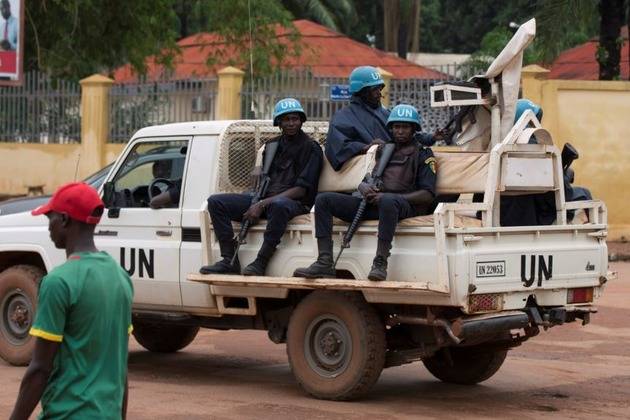
War between the Muslim Seleka and Christian anti-Balaka armed groups broke out in 2013 after Seleka rebels toppled the Christian president, Francois Bozize. Peacekeeping chief Lacroix tells VOA every effort is being made to redeploy U.N. forces on the ground to try to mitigate the impact of this violence and to protect civilians. "We do protect thousands of them [civilians] again in different locations in Central African Republic. We really not only protect them physically from those who want to go after them, but we help them get humanitarian assistance even though this is becoming quite challenging in many areas," Lacroix said.
The war in the Central African Republic has displaced about half a million people internally and has prompted an almost equal number of people to seek refuge in neighboring countries. The United Nations reports an estimated 2.4 million people - about half the CAR's population - are in need of humanitarian assistance. Lacroix says the United Nations is trying to reconcile the two ethnic communities by working with religious, civic and political leaders from different walks of life. He says it is crucial to move the political process forward in the CAR to achieve a durable peace.
Rising Ethnic Tensions in CAR Fuel Fears of Spike in Violence
See also:
Amnesty Says 'Horrific' Violence in Central African Republic
Saturday 9th September, 2017 - Rebels in a volatile region of Central African Republic are raping women and killing their male relatives in a "horrific surge" of violence that is now clearly along sectarian lines, Amnesty International warned Friday.
The human rights organization interviewed dozens of survivors in Basse-Kotto prefecture in the country's east, where a rebel group known as the UPC has carried out waves of attacks. The rebels are considered an offshoot of the mostly Muslim rebel coalition known as Seleka that overthrew the longtime president in 2013. While a period of relative stability allowed for Pope Francis to visit and for elections to be held, international observers now warn that Central African Republic is approaching the levels of violence seen at the height of the conflict in 2014.
One woman interviewed by Amnesty described a horrific attack in May. She said UPC fighters shot her husband in the legs when he tried to flee and then told the couple: "We're going to do something to you Christians that won't be forgotten for many generations." One of the men raped her, while another raped her husband - all in front of their five children, Amnesty said. Then they fatally shot her husband in the head.
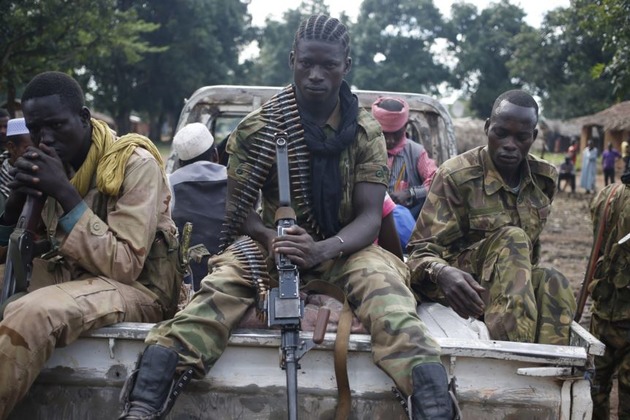
Joanne Mariner, senior crisis response adviser at Amnesty, said the U.N. peacekeeping force has proved ineffective in stopping such abuses. "Civilians are not accidental victims in this conflict; they are direct targets," she said. "If the U.N.'s mandate in the Central African Republic is to mean anything, civilians must be better protected."
The Central African Republic's Muslims and Christians had lived in peace for generations, even intermarrying. However, the brutal reign of the Seleka rebel coalition fueled hatred that led to months of retaliatory attacks. During Seleka's rule, its fighters carried out scores of atrocities against Christian civilians. Seleka leaders disavowed the perpetrators as criminals. A new militia - Christian in name, though largely animist - soon arose to fight the Seleka.
Brutal vengeance was enacted against Muslim civilians, many of whom hated the Seleka themselves. Nearly the entire Muslim population of the capital, Bangui, fled to the north or to neighboring Chad and Cameroon. The latest violence has been particularly worrisome because it has engulfed parts of the country that were largely untouched during the worst of the earlier conflict.
Amnesty Says Horrific Violence in Central African Republic
Similar threads
- Replies
- 13
- Views
- 474
- Replies
- 49
- Views
- 781
- Replies
- 22
- Views
- 437
- Replies
- 16
- Views
- 345
Latest Discussions
- Replies
- 227
- Views
- 1K
- Replies
- 51
- Views
- 279
- Replies
- 37
- Views
- 138
Forum List
-
-
-
-
-
Political Satire 8032
-
-
-
-
-
-
-
-
-
-
-
-
-
-
-
-
-
-
-
ObamaCare 781
-
-
-
-
-
-
-
-
-
-
-
Member Usernotes 468
-
-
-
-
-
-
-
-
-
-
